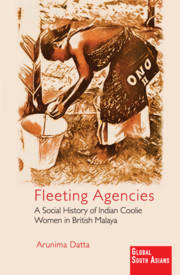Book contents
- Frontmatter
- Dedication
- Contents
- List of Tables
- List of Figures
- List of Abbreviations
- Acknowledgments
- Introduction
- 1 Coolie Women in the Empire’s Rubber Garden: Historical and Contextual Background
- 2 “Tapping” Resources: (Re)Figuring the Labor of Coolie Women on Estates
- 3 Managing “Partnerships”: Domesticity and Entrepreneurial Endeavors
- 4 Negotiating Intimacies and Moralities: Enticements, Desertions, Violence, and Gendered Trials
- 5 Becoming “Ranis”: Coolie Women as Rani Jhansi Regiment Recruits in World War II
- Conclusion
- Epilogue
- Glossary
- Notes
- Bibliography
- Index
1 - Coolie Women in the Empire’s Rubber Garden: Historical and Contextual Background
Published online by Cambridge University Press: 31 December 2020
- Frontmatter
- Dedication
- Contents
- List of Tables
- List of Figures
- List of Abbreviations
- Acknowledgments
- Introduction
- 1 Coolie Women in the Empire’s Rubber Garden: Historical and Contextual Background
- 2 “Tapping” Resources: (Re)Figuring the Labor of Coolie Women on Estates
- 3 Managing “Partnerships”: Domesticity and Entrepreneurial Endeavors
- 4 Negotiating Intimacies and Moralities: Enticements, Desertions, Violence, and Gendered Trials
- 5 Becoming “Ranis”: Coolie Women as Rani Jhansi Regiment Recruits in World War II
- Conclusion
- Epilogue
- Glossary
- Notes
- Bibliography
- Index
Summary
As in all other plantation colonies, Indian labor migration to Malaya in the initial phase was primarily short-term and overwhelmingly male. It was clearly a period of “men moving,” a term used by Eric Hobsbawm in his study The Age of Capitalism to describe the nineteenth-century cross-regional bulk movement of men, primarily of the laboring class. This gendered migration to Malaya soon changed. Rising Indian nationalist movements highlighted the skewed gender ratio amongst laborers recruited from India, which they asserted was the cause of “immorality,” including a range of social and moral vices, among Indian coolies overseas. Based on this argument, some nationalists pushed for a complete ban on overseas labor migration from India while others argued for a more balanced gender ratio. Such nationalist voices led planters in Malaya to fear the loss of their regular labor source from India. British planters and administrators, therefore, promoted a gender-based strategy for labor recruitment, not merely to appease nationalists but, more significantly, to ensure a local means of reproducing labor in the future. Consequently, the fears of the planters led to an incentivized migration of coolie women and coolie families. Whilst the primary aim of this policy was to ensure a secure future labor supply, it was officially presented as establishing morality and ideal family life amongst overseas Indian laborers in plantation colonies, thus seeking to deprive nationalists of an emotive mobilizing issue by showing that their concerns were being addressed. Indian women wishing to migrate out of India for a myriad of socioeconomic and cultural reasons often capitalized on such gendered incentivization of coolie migration. Even though many planters throughout Malaya valued coolie women both as laborers and as the source of future labor reproduction, which would decrease the planters’ reliance on imported labor from India, plantation and migration lore has constantly celebrated coolie men and erased the narratives of coolie women.
This chapter investigates why colonial administrators and European planters in British Malaya promoted Indian coolie women's migration to Malaya and simultaneously reveals how coolie women themselves actively engaged with such opportunities. The chapter thus modifies the prevalent view presented in labor and migration histories concerning Indians in colonial Malaya, which presumes that the coolie women only migrated as dependents of migrating coolie men, thus discounting the choice of Indian women to migrate and become coolies.
- Type
- Chapter
- Information
- Fleeting AgenciesA Social History of Indian Coolie Women in British Malaya, pp. 27 - 47Publisher: Cambridge University PressPrint publication year: 2021



